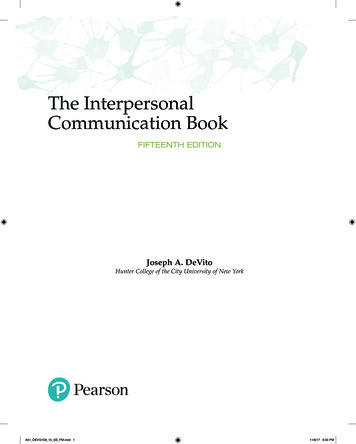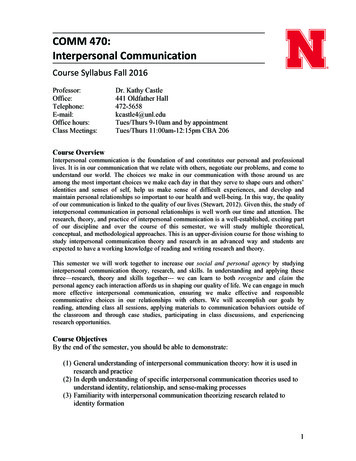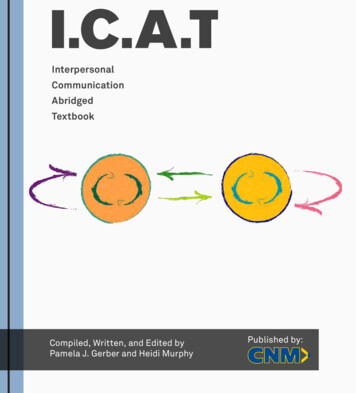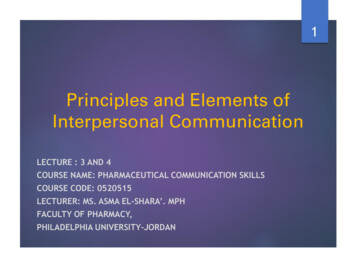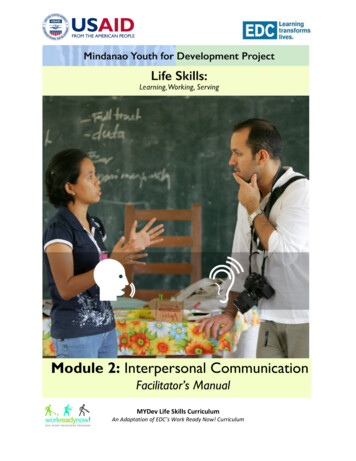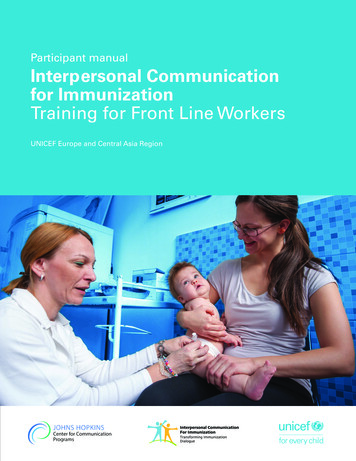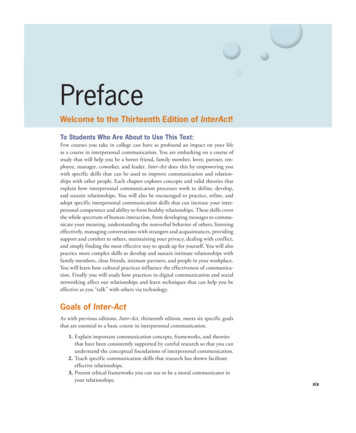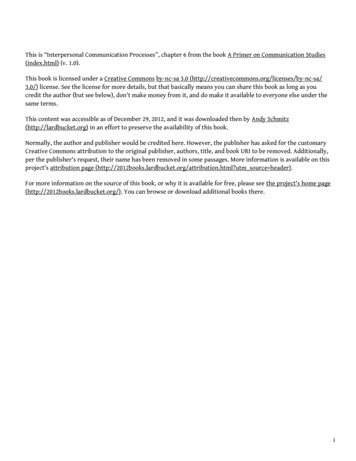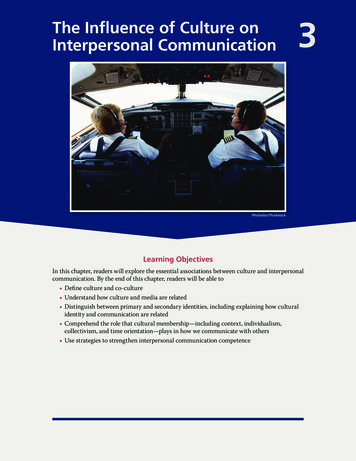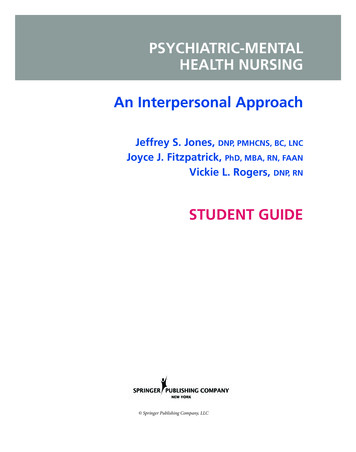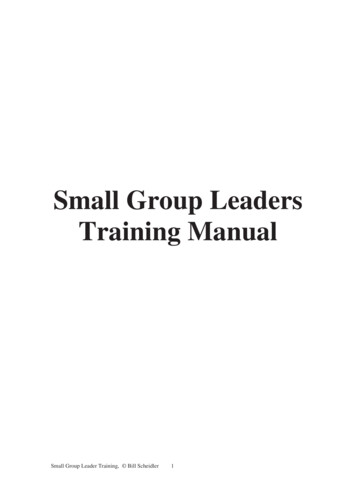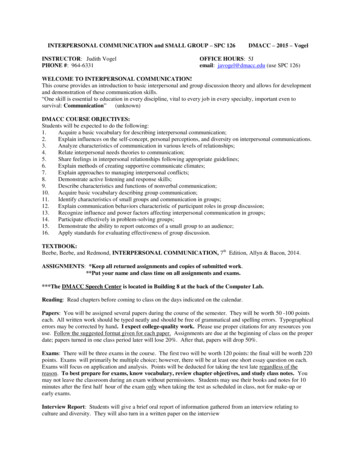
Transcription
INTERPERSONAL COMMUNICATION and SMALL GROUP – SPC 126INSTRUCTOR: Judith VogelPHONE #: 964-6331DMACC – 2015 – VogelOFFICE HOURS: 5Jemail: javogel@dmacc.edu (use SPC 126)WELCOME TO INTERPERSONAL COMMUNICATION!This course provides an introduction to basic interpersonal and group discussion theory and allows for developmentand demonstration of these communication skills.“One skill is essential to education in every discipline, vital to every job in every specialty, important even tosurvival: Communication”(unknown)DMACC COURSE OBJECTIVES:Students will be expected to do the following:1.Acquire a basic vocabulary for describing interpersonal communication;2.Explain influences on the self-concept, personal perceptions, and diversity on interpersonal communications.3.Analyze characteristics of communication in various levels of relationships;4.Relate interpersonal needs theories to communication;5.Share feelings in interpersonal relationships following appropriate guidelines;6.Explain methods of creating supportive communicate climates;7.Explain approaches to managing interpersonal conflicts;8.Demonstrate active listening and response skills;9.Describe characteristics and functions of nonverbal communication;10.Acquire basic vocabulary describing group communication;11.Identify characteristics of small groups and communication in groups;12.Explain communication behaviors characteristic of participant roles in group discussion;13.Recognize influence and power factors affecting interpersonal communication in groups;14.Participate effectively in problem-solving groups;15.Demonstrate the ability to report outcomes of a small group to an audience;16.Apply standards for evaluating effectiveness of group discussion.TEXTBOOK:Beebe, Beebe, and Redmond, INTERPERSONAL COMMUNICATION, 7th Edition, Allyn & Bacon, 2014.ASSIGNMENTS: *Keep all returned assignments and copies of submitted work.**Put your name and class time on all assignments and exams.***The DMACC Speech Center is located in Building 8 at the back of the Computer Lab.Reading: Read chapters before coming to class on the days indicated on the calendar.Papers: You will be assigned several papers during the course of the semester. They will be worth 50 -100 pointseach. All written work should be typed neatly and should be free of grammatical and spelling errors. Typographicalerrors may be corrected by hand. I expect college-quality work. Please use proper citations for any resources youuse. Follow the suggested format given for each paper. Assignments are due at the beginning of class on the properdate; papers turned in one class period later will lose 20%. After that, papers will drop 50%.Exams: There will be three exams in the course. The first two will be worth 120 points: the final will be worth 220points. Exams will primarily be multiple choice; however, there will be at least one short essay question on each.Exams will focus on application and analysis. Points will be deducted for taking the test late regardless of thereason. To best prepare for exams, know vocabulary, review chapter objectives, and study class notes. Youmay not leave the classroom during an exam without permissions. Students may use their books and notes for 10minutes after the first half hour of the exam only when taking the test as scheduled in class, not for make-up orearly exams.Interview Report: Students will give a brief oral report of information gathered from an interview relating toculture and diversity. They will also turn in a written paper on the interview
Special Projects: Students will complete a paper relating to a movie selected by the instructor. Another paper willbe assigned on self-concept. Several 10 point assignments will be given. Other assignments will be made at thediscretion of the instructor.Group Presentation: Each student will be expected to prepare for and take part in the presentation of a groupdiscussion. Three grades will be assigned: a group grade, an individual grade, and a preparation grade. A list of allsources must be turned in. Students must take part in the group discussion to receive a grade for that assignment.In-class activities may result in additional points or opportunities for extra credit. No make-ups.ATTENDANCE:Regular attendance is essential in an interpersonal communication course. Interaction between class members is theessential context within which interpersonal skills are developed. Therefore, attendance is required at all classes.Regular semester MWF students are allowed six absences for any reason without penalty; TTH students are allowedfour, evening students are allowed up to two. Penalties for excessive absenteeism range from loss of coursepoints to failure of the course. Typically, the course average will be dropped 2% for each additional absencebeyond what is allowed based on a MWF regular semester course. Classes begin promptly. Interim students andsummer evening students are allowed one absence without penalty with 8% penalty for additional absences.Summer MWF students are allowed four absences; summer TTH are allowed three absences without penalty. Twotardies or nappings in class will count as one absence.You must contact me prior to the class if you hope to make up an exam with a 10 % penalty, regardless of thereason. If there is no prior notification, the penalty is 20 %. Exams must be made up within three school days fromthe scheduled date of exam. After three school days, the penalty is 50%. If you miss a class, it is your responsibilityto learn what was covered and announced that day and to required handouts or assignments that were given.STATEMENT OF COURSE ETHICS:Students are expected to research and prepare their own papers and group work. They should not use the work ofothers and present it as their own. Furthermore, students should clearly give credit to responsible parties for ideasand materials used in their assignments. A listing of all resources, written or oral, is required for each assignment.Students who deliberately plagiarize or use other people’s work will receive a zero for the assignment and may failthe course. Student assignments will be checked for plagiarism.In addition, it is expected that students treat each other and the instructor with respect. Language, materials, andattitude should not be offensive to members of the group. Use of swearing, cursing, profanity, obscenity, and otherinappropriate language or materials is unacceptable at any time and will result in no credit for the project if usedduring an assignment. Students having questions on material should consult the instructor before the assignment isdue. **Please turn cell phones off or to vibrate. Good manners are expected. **If you are running a fever or aretoo ill to attend class, don’t come! Please do not come to my office or stop me in the hall. Call or email me instead.GRADING:100-90 A89-80B79-70C69-60D59 and belowFA percentage of the total assigned points will be taken to determine the course grade. Positive participation andregular attendance can add 2% to your final grade. A maximum of 21 extra credit points will be allowed. Otherextra credit must be approved by the instructor. Up to 20% of the grade on each assignment will be based ongrammar, spelling, and mechanics.*All major class assignments and exams must be completed to receive course credit.**Students’ speeches, assignments, and survey responses may be used for course assessment purposes. Students are responsible for assignments sent electronically to be received on time and in readable form.Sigma Chi Eta is a speech communication honors society and is part of the National CommunicationAssociation. The Iowa Communication Association has a Recognition of Achievement in Speech
Communication that it presents. Students must take 9 credits of speech or speech related courses with a 3.25gpa in those courses and a 3.0 overall gpa to qualify. Ask for more details about earning these honors. Join Communicate! club. It is a fun and relaxed way to meet friends and improve communication skills. Thegroup meets over lunch on selected Fridays in Bldg. 2. Free dessert is provided!Disclaimer:“This syllabus is representative of materials that will be covered in this class; it is not a contract betweenthe student and the institution. It is subject to change without notice. Any potential exceptions to statedpolicies and requirements will be addressed on an individual basis, and only for reasons that meetspecific requirements. If you have problems related to this class, please discuss them with me.”Academic & Educational Advising: https://go.dmacc.edu/advisingAcademic Achievement academic achievement center.aspxAcademic e DMACC Educational Services Procedures ES 4670. A. and B” for information on plagiarism,cheating, information about appeals procedures or reference publication that addresses this informationin detail.”Add/Drop Dates: https://go.dmacc.edu/registration/pages/add drop.aspxAdmissions & Registration: https://go.dmacc.edu/registrationBlackboard: pxCareer Connections: eer Counseling: eercounseling.aspxCellular Phone Use Statement: cellphone.aspxClery Crime Report: cleryact.aspxComputer Labs: spxDays to Register for Next Term: ull.aspxDMACC Consumer Information: https://go.dmacc.edu/consumerinfoFinancial Aid: https://go.dmacc.edu/fin aidGrievance Procedures:https://go.dmacc.edu/student services/pages/policies procedures.aspxLibrary: https://go.dmacc.edu/libraryMidterm & Final Dates: ION POLICY: Des Moines Area Community College shall not engage in or allowdiscrimination covered by law. This includes harassment based on race, color, national origin, creed,religion, sex (including pregnancy and marital status), sexual orientation, gender identity, age, disabilityand genetic information. Veteran status in educational programs, activities, employment practices, oradmission procedures is also included to the extent covered by law. Individuals who believe they have
been discriminated against may file a complaint through the College Discrimination ComplaintProcedure (ES4645). Complaint forms may be obtained from the Campus Provost's office, the AcademicDean’s office, the Judicial Officer, or the EEO/AA Officer, Human Resources. For requests foraccommodations, the Accommodation/Section 504/ADA Coordinator can be contacted at 515-9646857. For Title IX questions and concerns contact 515-964-6850.Students who wish additional information or assistance may refer to Student Services procedure ES4645 located at https://go.dmacc.edu/student services/int. Click Policies & Procedures.Employees and applicants who wish additional information or assistance may contact the EEO/AAOfficer, Human Resources, Bldg. 1 on the Ankeny Campus, or refer to HR Procedures 3000, 3005, 3010,3015, and 3020 athttp://www.dmacc.edu/hr/hrpp.aspProgram Development/Academic Support Services Director is the official Student AccommodationOfficer/Section 504/ADA Coordinator for DMACC. The ADA Coordinator’s office is located in Bldg. 6-10Eon the Ankeny Campus and may be contacted by voice (515-964-6857). The ADA Coordinator isresponsible for ensuring that the college complies with federal regulations that guarantee qualifiedstudents with disabilities equal access to all programs and services. Any student, faculty, or staffmember may contact the ADA Coordinator’s office for clarification of federal regulations, appeal of agrievance, or resolution of a disability-related problem.Policies & Procedures Introduction: https://go.dmacc.edu/handbook/polproceduresRefund Policy: http://www.dmacc.edu/refund.aspSafety Page: https://go.dmacc.edu/safetyServices for Students with Disabilities: https://go.dmacc.edu/student services/disabilitiesAny student with a documented disability who requires reasonable accommodation should contact theDisability Services Coordinator Jennifer Argo at 515-964-6850 or jdargo@dmacc.edu or the counseling& advising office on any campus to apply for services.Sexual Harassment /Pages/nondiscrimpolicy.aspxSoftware Notice:“All the software used in this class is copyrighted; therefore, it is not for distribution, copying, or personaluse. This software is the property of Des Moines Area Community College.”Student Handbook: https://go.dmacc.edu/handbookStudent Responsibilities and /Pages/rightsandrespon.aspxTechnology Pages/technologyusage.aspxTutoring: utoring.aspxWeather Policy:“Individual circumstances such as health, childcare, rural roads, distance from the College, etc. can vary greatlyamong students and staff. It is always DMACC’s goal to provide safe learning conditions, as well as provide theopportunity for students to attend classes when the vast majority is able to safely attend. The final decision to cometo College can only be made by the individual student based on their specific extenuating circumstances that maymake it unsafe for them to travel. During adverse weather, DMACC faculty is considerate of students who areunable to attend classes due to unique extenuating circumstances. It is the responsibility of each faculty member tonotify their students (in addition to their dean or provost) thru some predetermined means if they are must postponeor cancel a specific class due to weather or illness.”
TENTATIVE SCHEDULE FOR SPC 126 – Fall 2015 – TRVogelAug.21Introduction to Course/Introduction to Interpersonal26Interpersonal TheoryCh. 128Cultural Diversity (Interview assigned – due 10/9)Ch. 4Sept. 2Cultural Diversity4Self-concept (Paper #1 assigned – due 9/11)Ch. 29Self-concept11PerceptionCh. 316ListeningCh. 518Listening23EXAM25Communicating Verbally(Paper #2 assigned – due 10/14)Ch. 630Communicating VerballyOct. 2Communicating NonverballyCh. 77Communicating Nonverbally9Diversity Interview Reports14Conflict ManagementCh. 816Conflict Management21EXAM23Understanding RelationshipsCh. 928Relationships30Developing Relationships(10/31 last day to drop w/o grade) Ch.11Nov. 4Relationships (Paper #3 assigned – due 11/18)6FamilyCh. 1211Family13Relationship ChallengesCh. 1018Intro to Group Discussion (Group project assigned)20Group Theory and Planning25Colleagues in Workplace/Group planningCh. 12Dec. 2Small Group Presentations4Small Group Presentations5-11 Finals*Some topics discussed may be emotional depending on your personal experiences.**Several 10-point “mini-assignments” will be announced in class.***Only seven chapters of extra credit questions are allowed for the semester. All assignmentsand exams must be successfully completed to pass the course. Attendance counts on coursegrade! Turn in college quality work on papers and assignments. Have all papers andpresentations prepared on the assigned date. You must notify me prior to class if you hope tomake up an assignment or exam. Late points will be taken regardless of the reason. If youbelieve you need special accommodations, contact the Special Needs Coordinator. I cannot offerspecial accommodations unless I receive a letter from the SNC. It is your responsibility to learnwhat material or announcements you missed if absent.Build your resume by earning state and national Speech Honors and by joining Communicate!
INTERPERSONAL COMMUNICATION and SMALL GROUP - SPC 126 DMACC - 2015 . attendance is required at all classes. Regular semester MWF students are allowed six absences for any reason without penalty; TTH students are allowed . summer evening students are allowed one absence without penalty with 8% penalty for additional absences.
